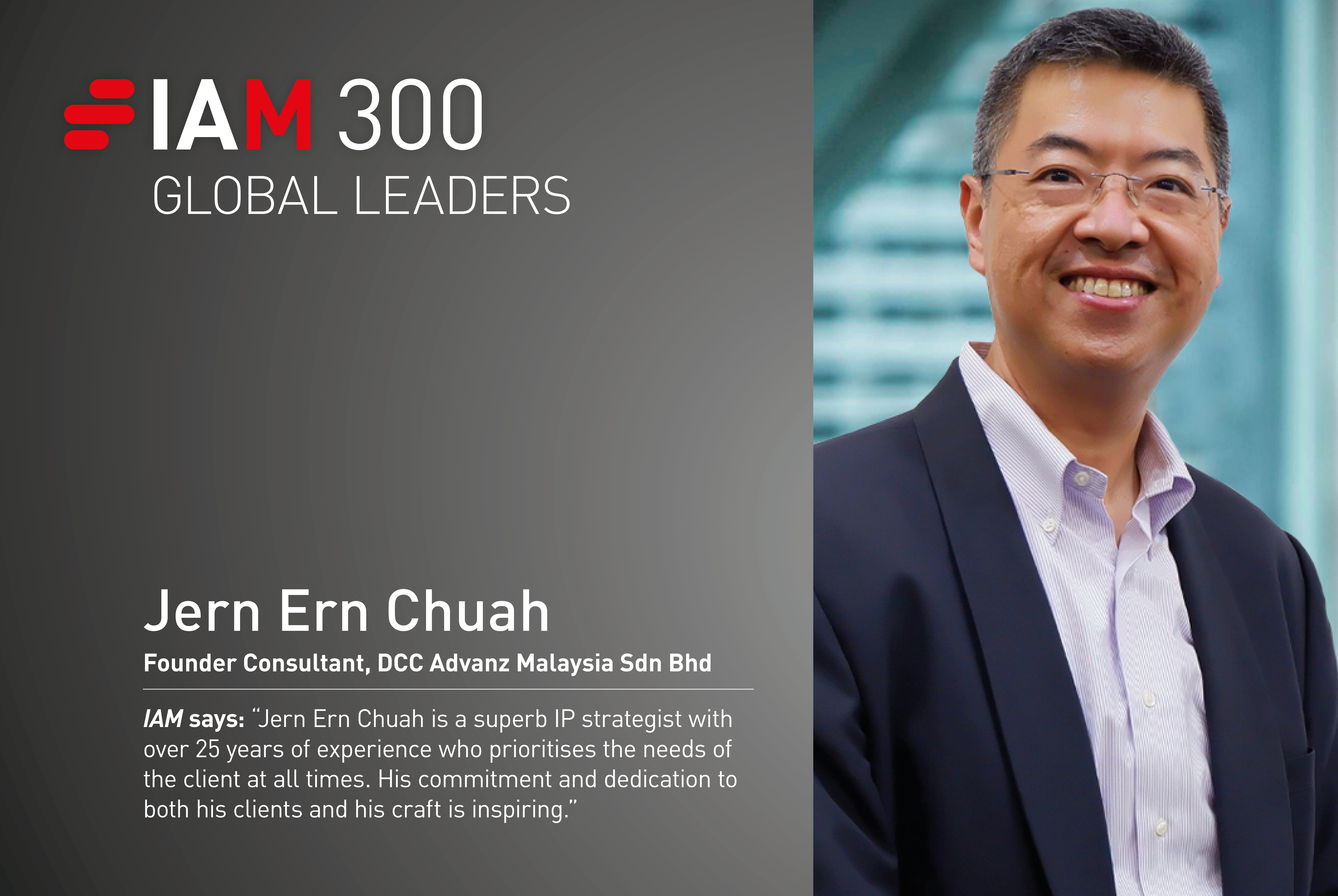Jern Ern Chuah
What led you to found your own company, and how did doing so shape your ideas about what inspiring leadership should look like?
I would first mention that the company today is a far cry from what it was in 2000. It went from a couple of tables in a rented space to becoming a part of an international, successful and thriving practice group as DCC Advanz under the QANTM Intellectual Property umbrella. What motivated me then is what still motivates us now – the realisation that intellectual property is everywhere and is a part of every business. We are passionate about being at the forefront of intellectual property in building a bridge between bright ideas and businesses.
The support from our clients, friends and associates inspires us to think up new ideas on how to make our business better and deliver a better service. It was never our intention to be just another IP service provider; this has shaped our company through our different approach and pairing practical business advice and insight with high-quality and prompt services. It has also inspired the team, many of whom have become leaders in their own right. To me, the measure of inspiring leadership is not about being a trailblazer and charting the path ahead, but is rather about nurturing the team that travels alongside you, instilling those same values and beliefs. That sets in place a legacy for those that will continue to carry the torch and be an inspiration for the next generation.
You are heavily involved in dispute-related actions. What is your take on the talk of arbitration or other alternative dispute resolution methods being used to settle disputes?
Most people would love to resolve disputes in the cheapest and most time-efficient way, and such alternative methods may work well. Crucially, we put ourselves in our clients’ shoes and think, what makes the most sense from a business and cost perspective? What are we trying to achieve? Do we need to attack this with our full arsenal at all costs, or is there another way? There is nothing pre-set about all disputes, every single aspect is bespoke.
What are some common mistakes that foreign rights holders make when enforcing their patents in Malaysia, and how can they avoid these?
First, insufficient groundwork. Some rights holders rush into initiating a suit or even ancillary enforcement actions when detailed information and evidence has yet to be gathered. This makes court and other related proceedings more difficult to navigate.
Second, the belief that the court option is the only one available. Not exploring all options may end up prolonging proceedings in both time and cost without obtaining the desired result.
Finally, seeing rights holders with improper or unclear documentation with their licensees or collaborators, which then becomes a minefield to navigate especially when problems arise.
You are renowned for your expertise in planning effective IP strategies for clients. In your view, what makes a world-class enforcement strategy?
An effective strategy is one that is holistic, structured and built from the ground up. It cannot be a ‘set and forget’ strategy or one that is ad hoc. It involves everyone in the business from where intellectual property is created (the development team) to where decisions are made (the management team) as these are the eyes and ears on the ground. It is paramount to consider surveillance and enforcement strategies that canvas both the physical and virtual realms as consumers pivot ever more into online marketplaces.
A sound enforcement strategy is also one that is able to be initiated promptly, repeatable across jurisdictions and cost effective and can meet the objectives of the enforcement action. Suitable frameworks and education are key. Companies should always be on the innovation lifecycle; staying one step ahead of the competition is a critical IP strategy as well!
What recent decisions or legislative developments are having the biggest impact on IP strategy in Malaysia right now?
Substantive amendments to our Patents Act in 2022 have brought – and will further bring – about a change to Malaysia’s patent landscape. Third parties can now formally make observations on patent applications and post-grant oppositions will be introduced soon. These provide more options for third-party challenges; in the past, all challenges had to be initiated at the High Court. It is likely that we will see an active opposition scene develop in Malaysia.
Jern Ern Chuah
Founder, Consultant
[email protected]
Jern Ern Chuah founded Advanz Fidelis in 2000 before it integrated with Davies Collison Cave in 2022 to become DCC Advanz Malaysia. He has extensive experience across all forms of intellectual property, primarily around commercialisation, dispute resolution and strategy. Mr Chuah’s expertise lies in crafting symbiotic business and IP management plans and strategies, advising on complex disputes and in team mentorship and skills development in delivering high-quality services to clients.
